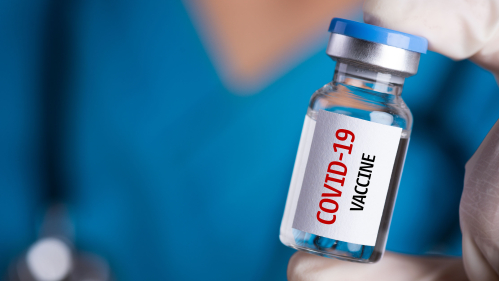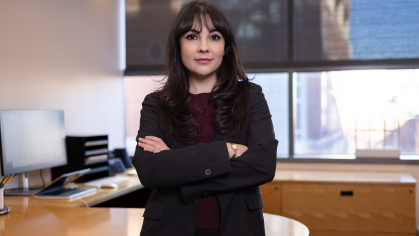Rutgers Selected as Site for COVID-19 Vaccine Clinical Trial

New Jersey Medical School and University Hospital to conduct trial over the next 25 months
New Jersey Medical School (NJMS) has been selected by Moderna as one of over 90 sites across the United States to recruit adults to volunteer for the COVID-19 vaccine trial (known as the COVE Study) that will test the safety and effectiveness of the vaccine in approximately 30,000 participants nationwide.
The Moderna trial is being conducted at New Jersey Medical School and University Hospital and at other institutions throughout New Jersey in collaboration with the National Institutes of Health.
Rutgers is also likely to participate in additional vaccine trials over the next several months. The university’s health care workers, faculty, staff and alumni, as well as members of the general community, have been offered the opportunity to participate in these studies.
The Phase 3 study will evaluate if mRNA-1273 boosts the immune system to produce enough antibodies against SARS-CoV-2, the virus that causes COVID-19, so it does not cause illness in case of infection. Some people will receive the active vaccine, and others will receive an inactive injection, and their experiences will be compared. Enrollment is completely voluntary, meaning no one needs to take the vaccine unless they want to, and all participants will provide informed consent.
“We are excited and hopeful as we begin participating in the COVE Study, understanding this is one of the most important and impactful clinical research studies in our lifetime,” said Shobha Swaminathan, principal investigator of the study at NJMS and medical director, infectious diseases practice at University Hospital. “We encourage individuals across the state to consider participating in this trial, which could bring the world one step closer to ending this global health crisis.”
“Vaccines prevent disease, and have contributed enormously to the world’s health, but the only way to prove whether a vaccine is safe and effective is through a comprehensive and inclusive clinical trial,” said Rutgers Biomedical and Health Sciences chancellor Brian Strom. “The clinical trials are being conducted in accordance with the principles of Good Participatory Practice to help ensure the ethical and scientific quality of this research and relevance to their local communities.”
COVID-19 is a global pandemic that has necessitated the testing of several vaccine candidates in unprecedented expedited time frames that have not historically been associated with the conduct of large-scale trials. These studies have been organized by the U.S. Department of Health and Human Services’ Operation Warp Speed endeavor, which seeks to produce and deliver 300 million doses of safe and effective vaccines with the initial doses available by January 2021, as part of a broader strategy to accelerate the development, manufacturing and distribution of COVID-19 vaccines, therapeutics and diagnostics. However, it is important to note that this speed necessitated by the global pandemic has not compromised the scientific integrity of the process, which remains intact, said Dr. Swaminathan.
“New Jersey Medical School and our site partner in Newark, University Hospital, care deeply about improving the health outcomes of our most vulnerable populations,” said NJMS dean Robert Johnson.
Johnson said New Jersey Medical School and University Hospital have been engaging with community groups throughout the greater Newark area to explain the clinical trial process and the importance of enrolling volunteers from the groups most impacted by the pandemic, such as individuals over 65 years old, Black and Latinx communities, essential workers, and adults of all ages with underlying health conditions.
“Community partnerships bonded by trust are critical to combat health inequities and to improve the lives of all. We are delighted to offer this opportunity to Newark and New Jersey, and will continue our commitment to transparent conversation with the communities we serve,” Johnson said.
As Rutgers begins to participate in clinical trials to test the effectiveness of a COVID-19 vaccine, researchers have committed to these 10 principles to guide the university's work:
- Rutgers, The State University of New Jersey, is committed to improving the health of all New Jerseyans, and people all over the world.
- COVID-19 is continuing to sicken and kill people in New Jersey, the United States and the world.
- Vaccination is likely to be the most important way in which individuals can be protected from the virus.
- Rutgers is committed to helping all New Jerseyans get vaccinated with a safe and effective COVID-19 vaccine.
- Since vaccine safety and efficacy may vary in different population groups, testing of vaccines should include people from diverse populations.
- Currently, vaccine candidates are being tested, and Rutgers doctors and scientists are leading important trials that are also being carried out across the United States and worldwide.
- Enrollment in any Rutgers vaccine study is strictly voluntary.
- Rutgers is committed to testing these vaccine candidates across diverse groups, so that all are represented and all can have access to the vaccine.
- All potential adverse effects will be closely monitored by independent review panels, and results from the trials will be openly shared in the usual manner for public health initiatives at the earliest opportunities.
- Rutgers University urges all New Jerseyans to work together to defeat this terrible scourge.


